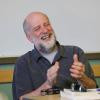
Contact Will
Will Ryan
413.549.4600

Will Ryan
413.549.4600
William Ryan, emeritus senior faculty associate in the School of Social Science, has been at Hampshire since 1980.
Before then, he was a counselor at Johnson State College in Johnson, Vermont, and also a high school history and English teacher. He has a B.A. and M.Ed. from the University of Vermont, and an M.A. in American history from the University of Massachusetts.
A freelance writer with an interest in outdoor recreation, he has written two books on fishing and serves as a contributing editor at Gray's Sporting Journal, where he edits and writes a column on the history of hunting and fishing.